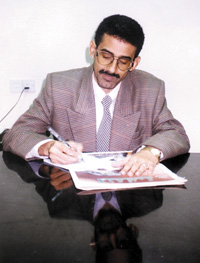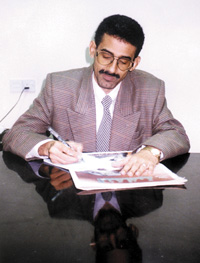
Samir Al-Yusufi to Yemen Times: “The case has definitely taken other dimensions which are neither logical, nor related to Islam, but are rather political.” [Archives:2000/29/Interview]
July 17 2000

Nowadays, Al-Yusufi has become the talk of Islamic leaders in mosques, demanding his arrest and punishment. Although he apologized twice, he has been arrested. He was released after the interference of the Minister of Information who threatened resignation from the Ministry if Samir stayed in prison. Jalal Al-Sharaabi of the Yemen Times met with him and filed the following:
Excerpts:
Q: A great war was raised against you by the mosque preachers and everywhere, how did the story begin?
A: In the beginning, I never wished that this thing would happen. Firstly, because the aim of this thing seems different from that proposed in mosques and streets. As for how it started, as far as my information goes, it started in the parliament provoked through one of the Islamic parties in Yemen. The issue was put forth for discussion and signatures were collected from other parties. The issue was then taken to the general attorney . On that same day I got a phone call from the general secretary of Islah party Mr. Mohammed Alyadoomi, questioning about what was published in the Al-Thaqafiah newspaper about the novel ‘Sana Madina Maftuha’ which he vowed for the atheist Mohammed Abdulwali and tried to get a straight confession from me about the reasons for publishing the matter. In his opinion, this newspaper should not have published that story. I replied that this book is already published and circulated in the markets and had been printed more than six times with permission from the Ministry of Information but he ignored this aspect and threatened that he would treat me right and will raise the case to the highest level of the presidency and the government and kept the phone. After a little while his deputy Mr. Abdulwahhab Al-anisi called me up, trying to make up for Al-Yadoomi’s call and saying that it is an advice, not a threat but his methods are like that.That day he asked me to present an apology related what had been published, I did not have an objection but I saw that the threat should be discussed first because he is a party leader and has his influence in the area. After two days I was surprised to see in the Thowrah newspaper that the president had ordered investigation into what was published in Thaqafiah newspaper! And one day before that, there was an investigation committee formed from the managerial council of Jumhooriya newspaper who Thaqafiah is published by. The council was headed by Mr. Md. Al-Mujahid. And the conclusion was that this novel was already published and authorized and what the paper did was to just republish what was published already, and the council saw that the case does not deserve the chaos and fuss caused by those who took up the topic.
Q: Did this trigger any proceedings before this happened?
A: Since one and a half years I have been receiving threats either through phone or through mosques. This was due to a previous case which was raised by some of the leaders of the same party through the attorney chairmanship in Taiz. But the case was saved then on the ground that the topics under discussion had been replied to in the same paper, and it lost currency. This was before 8 months approximately.
Q: How do the court procedures take place now?
A: I see that the law in Yemen is the only way out for all these problems. And that it should be the reference which all should conform to. If we lose our trust in law, then we will lose peace in general.
What is strange in this issue is that when I had gone to the court last Tuesday I was surprised that the judge did not receive the case file from the attorney until the end of the court session, And lots of the audience had seen that. The other thing that surprised me is that the judge called people by their names in the hall. We have not heard this kind of a precedent. We objected in the court through the lawyer specialty because the court concerned was in Taiz. It is shocking that that the judge ordered my imprisonment until a verdict is out although I was not involved in the case at all. These are a few observations I put in the hands of the law which should be kept in mind to preserve the sanctity of it and to respect it.
Q: Do you think the novel contains what was said it did in the case?
A: If in a column or an article something insulting to a particular person was mentioned, then we as Muslims or any Muslim for that matter would see it an insult to his religion and will raise objections. Our religion permits to talk and discuss and advice and we should argue till we are convinced, but what happened in that novel is that the novel talks about a particular era of time and refers to it as a time of cruelty and abuse for religion. It was the Imam’s era. It was a bed time and the novel expressed realities of that time, and how the king used the religion . What happens in the novel is that a person whose name was Numan is the hero, he was presented in a skewed manner. He commits lots of sins and at one point of time questions God why he took his wife away from him, that it was unfair. He does not deny the existence of God but he was arguing with him and blaming him; This part itself shows some faith in the sense that the person himself is an imaginary character, not really existing in reality, so that we could take him to court. Mohammed Abdalwali did not leave his religion but he represented it through a character’s voice in the novel. There are many such such scenes. Even in the prophet’s speech and in the Holy Quran such things occur. It is mentioned that when a man was traveling, his food and water was lost from him; He gave up the search, but he finally found it. Then he said to God, ” you are my slave and I am your master.” The prophet said that this was said out of happiness; Numan mentioned it in the novel in a mood of misery and hopelessness.
Q: Does this mean that the case has taken a dimension other than that laid by the accusers?
A: The case has definitely taken other dimensions which are neither logical nor related to Islam, but are rather political. Some are trying to take advantage of this to serve political aims or to avenge themselves others whom they see a threat to their benefits or their needs. And as I said earlier, some might see in it insult to particular persons and not to God himself. But considering people who were subjected to strong words and insults he saw his case worse than the insult. The paper was accused to have insulted God where the truth is that it hurt a few persons’ ego who are reckoned in the Islamic stream in Yemen.
Q: Where does Mr. Samir find himself now?
A: I find myself alone, all harassing me. Some think I work for the sake of a particular side and some say I seek new fame. And some see that I have actually wanted to publish such these to insult God, therefore I find myself alone now.
Q: How do you evaluate the stance of YJS and other media organizations?
A: I am very pleased with the stand of the Arab Journalists Unions which dealt with my issue as a journalist disregarding my political affiliation.
Closure of Al-Thaqafiah will be repeated in case of other newspapers. Unfortunately, some organizations deal with the issue in double standards despite the fact that I have not done something wrong by publishing a novel which had been authorized by the Ministry of Information and is available in bookshops.
Q: Does it mean that you have been wronged for something you have nothing to do with?
A: It is a pity to say that the newspaper has left its doors wide open for its enemies. We were thought be one of to them and, I myself was thought to be one of those extremists. I thought that they would stand by us should we need them. They were supposed to defend the freedom of expression and press. Unfortunately, Al-Thaqafiah was the only newspaper to give access to such people to write, believing in the principle of freedom of expression. It was an attempt to bring all viewpoints closer to one another. I never expected such treatment from them.
Q: Is there any message you would like to give to people?
A: I still have hope that my colleagues will show more solidarity with Al-Thaqafiah, the newspaper which tried to embrace all political trends.
Q: In view of such pressure, will you find yourself obliged to seek asylum?
A: It is too early to determine this. I believe that the country has room enough for all. If we leave it we will give a chance for these extremists to be stronger. However, if I discover that our judiciary system has lost its credibility and independence I will abandon this country at any time.
Q: Was the newspaper imitated by other official papers?
A: The official media looked at Al-Thaqafiah from two angles. Some of them thought that it had gone beyond convention and it needed to be stopped. Others believed that it had established good reputation, so they decided to imitate it.
Q: Do you think that you are fighting against some specific individuals other than demanding Justice?
A: Certainly. Those who the paper has thrown masks of. Those have already called for in mosques for the closure of the paper and my arrest. I think that no judge will dare go against them because he will be considered against religion.
A well known Islamist leader called for my trial. He even criticized the President for keeping silent. His words in the mosque against me were circulated as a “fatwa” (religious opinion that must be followed).
Q: Was he Sheikh Abdul Majeed Al-Zindani?
A: Yes he was.
Q: What is the message you would like to send to the press-care organizations?
A: I would like to tell all organizations concerned with press freedom that it is not a case of a man who stood against religion, but it is rather a case of some people who think that the freedom of press may affect their interests.
Q: Any last words?
A: I thank the Yemen Times which has always been an example of freedom of expression. Its founder, late Dr. Al-Saqqaf was able to make it popular in and outside Yemen. The certificate he was awarded with by the Press Organization in America proves that the Yemen Times is really distinguished from the others and it respects freedom of opinion and expressions.
Report on Law & Diplomacy Page
——
[archive-e:29-v:2000-y:2000-d:2000-07-17-p:./2000/iss29/intrview.htm]


